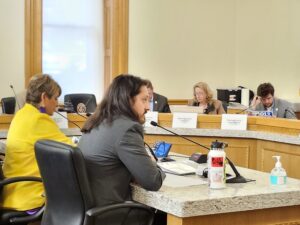Moderate and pragmatic candidates won big in both parties’ legislative primaries Tuesday, with Democrats appearing to oust progressive Reps. Elisabeth Epps and Tim Hernandez and Republicans fighting back conservative challenges to several sitting legislators.
On the Democratic side, the results represent a push back against voters and vacancy-committee members increasingly choosing more progressive candidates over the past four years. Those legislators have pushed policies from rent control to significant environmental regulations that have clashed not only with their more pragmatic caucus members but have led Gov. Jared Polis to threaten or carry out vetoes angering some in his own party.
For Republicans, the results are in line with moderating trends from the 2020 and 2022 primaries but stand against efforts by the state party to get more conservative candidates elected, as it took the unprecedented step of endorsing in intra-party contests this year. Conservative, state-party-backed candidates lost in all eight of the Senate and House contests in which ideology — and the choice of whether to work with majority Democrats to improve bills or just oppose them and try to slow legislation — was a central issue.
What this means for the next legislative session — and for issues ranging from employment regulation to construction-defects reform — remains uncertain, as several key races will determine whether Democrats gain veto-proof majorities in both the House and Senate. But it seems to hint that legislators may be more willing to negotiate on key business issues and remain less likely to pass bills, such as a proposed ban on future oil-and-gas drilling that came and went quickly this year, that could prove devastating to certain industries.
Rare defeats in primaries for sitting House members
And what makes Tuesday’s results so crucial is the fact that many came in contests in Democrat- or Republican-heavy districts where the primary winner is extremely likely to win in November’s general election as well.

Colorado state Rep. Tim Hernandez, seated next to House Majority Leader Monica Duran, explains the Worker Freedom Act to a committee in March.
Voters in two heavily Democratic Denver districts appear, for example, to have voted out two of the House caucus’ most progressive members — police reform champion Elisabeth Epps and labor supporter Tim Hernandez, both known also for pro-Palestinian sentiments. As of late Tuesday, attorney Sean Camacho was leading Epps with 64% of the vote and former magistrate judge Cecelia Espenoza was besting Hernandez with 55% of the tally.
Meanwhile, Democratic Reps. Judy Amabile of Boulder and Lindsey Daugherty of Arvada — both of whom are socially liberal but have cast key votes for business — were handily winning primaries for two open, Democratic-held Senate seats. Daugherty’s primary drew particular attention, as she is seeking to replace term-limited Sen. Rachel Zenzinger, arguably the most pro-business member of that chamber’s Democratic caucus.
Attorney Michael Carter held a significant lead over progressive teacher Bryan Lindstrom in a key Democratic primary for an open House seat in the Aurora area. And Lakewood City Councilwoman Rebekah Stewart also seemed poised, with 59% of the vote, to defeat health-care activist Kyra deGruy Kennedy for an open, Democratic-held Lakewood seat.

Colorado House candidate Michael Carter speaks to a Colorado Chamber of Commerce event in May.
Some liberal victories in primaries
Still, more progressive candidates pulled out wins in several key Democratic primaries as well. Rep. Mike Weissman appears to have fended off well-funded attorney Idris Keith for an open Senate seat in Aurora, first-term Rep. Junie Joseph beat back an opponent in her Boulder district and Democratic-Socialist-backed candidate Yara Zokaie triumphed in a contest for an open, Democrat-held House seat in Fort Collins.
In Republican primaries, however, more pragmatic candidates — specifically, those who said they would work with Democrats to pass good consensus legislation and try to amend and improve bad-for-business bills — swept races over party-backed conservatives. Many of those unsuccessful candidates had said they don’t believe that cross-aisle efforts have achieved any meaningful wins and vowed to work against compromise and to stop Democratic legislative efforts through hard opposition instead.
In the Senate, incumbents Barbara Kirkmeyer of Brighton and Larry Liston of Colorado Springs handily defeated challengers, while Rep. Lisa Frizell easily won an open GOP-held Castle Rock seat. And in Colorado Springs, El Paso County Commissioner Stan VanderWerf garnered 60% backing in a primary for the swing seat of term-limited Republican Sen. Bob Gardner, which Democrats are hoping to flip in November.

Colorado state Sen. Barbara Kirkmeyer discusses a property-tax-cut bill in front of supporters at a news conference on May 6. Standing to her left is Rep. Lisa Frizell.
Clean sweep for consensus-seeking Republican candidates
In the House, Castle Rock Town Councilman Max Brooks, former House staffer Jarvis Caldwell of El Paso County and retired school administrator Lori Garcia Sander of Eaton all won ideologically divided primaries for open seats in GOP strongholds by large margins. And Rep. Mary Bradfield of Fountain once again beat back two primary challengers — all results that seem to assure the current House GOP leadership team under Minority Leader Rose Pugliese, remains in place rather than being ousted by its more conservative wing.
The legislative primaries’ decisive outcomes came on the same night that more pragmatic Republicans won three of four contested primaries for GOP-held or swing congressional seats — victories that could impact the November results dramatically.
One issue the primaries could impact could be construction-defects reform, which passed the Senate by a wide margin this year but was shut down in the more progressive House. Several winning candidates, such as Camacho, have said that they hope to push forward reform efforts in that area as a needed way to extend home-ownership opportunities to lower-income state residents.
